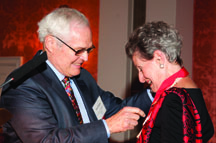Honors Mentorship Program Builds Community and Cougar Pride

by Lucy M. Bonner
Since its inception in the fall of 2010, the mentorship program at the Honors College has helped provide an entrée into the College’s community for many new students. However, the program does far more than introduce newcomers to the busy social events schedule—it offers academic benefits to mentees, maintains the close family feeling of the College, inspires pride in Honors and the University, and builds student involvement in the Honors College community.
Brenda Rhoden, the College’s director of student affairs and creator of the mentorship program, said, “Transition into the first year of college can be difficult for many students; research tells us that during the first semester, students decide whether they will ultimately proceed to graduation.” The mentorship program has been designed to help students feel included and successful in the Honors community—and to reduce the feelings of isolation at leaving home. Tyler Swensen, a current mentor who was a mentee in his first year, said, “My mentor helped me understand the importance of getting involved and gave me the sense of belonging that a new student needs. I can only hope that I was able to provide that same experience for my mentees.”
 Each mentor guides 15-20 new students through the hazards of the first term, with
weekly meetings to discuss problems, fears, and opportunities for getting involved.
Students quickly meet others of their class going through the same transition, as
well as upperclassmen who can offer advice. Nhon Le, a freshman and mentee of Conner Lund, described with enthusiasm how Conner was always interested in how they were doing
and that “he always answered questions quickly and really well.”
Each mentor guides 15-20 new students through the hazards of the first term, with
weekly meetings to discuss problems, fears, and opportunities for getting involved.
Students quickly meet others of their class going through the same transition, as
well as upperclassmen who can offer advice. Nhon Le, a freshman and mentee of Conner Lund, described with enthusiasm how Conner was always interested in how they were doing
and that “he always answered questions quickly and really well.”
Franco Martinez, this year’s mentor coordinator, organizes events and gives mentors problem-solving techniques, activity ideas, and sharing strategies to get students comfortable in their group. Other Honors College events augment the mentor schedule to encourage new students to get involved with the College. Football games, the Halloween party, and bowling at the UC sit alongside Fall Convocation and “academically purposeful” activities, like tutoring and study-a-thons, in the mentoring calendar.
Adventuring off campus has also proven popular: Tyler took his mentees to a Corn Maze at Dewberry Farm, for example, and fellow mentor Diego Lopez took his group to the Texas Renaissance Festival. Diego describes how wearing red when out and about in the city inspires pride in the University and bonding within the group. “Once the students take pride in the institution, the rest falls into place.”
While interacting with professors during the highly regarded Dinner with the Professors week, mentees not only experience the delights of Houston landmark restaurants like Star Pizza and Kanomwan, but also build confidence that translates into the classroom through their casual, off-campus interaction with professors.
The Honors mentorship program has a growing presence within the College. From the pilot year last fall, this year’s program reflects the additional preparation time and careful thought that has allowed for improvements. Right from the beginning freshmen are brought into the mentorship fold. As early as orientation, they have contact information for both Franco and their mentor, and a planner of upcoming events. As Brenda said, “That first semester can be an emotional rollercoaster, and it is beneficial to have lifesavers out there.”
As the program grows in popularity, the number of mentoring applications has soared. A further interview stage has been added to ensure each mentor has the time and ability to best help their mentees, as often the mentors are already involved with the College, through Honors Ambassadors or the Student Governing Board. If chosen for the program, mentors are guaranteed a highly coveted retreat counselor position, and retreat groups become mentor groups as the semester begins—continuing the relationship from orientation, to retreat, and throughout the semester. Brenda concluded, “We believe that participation in the program provides both academic and social support that are essential for student persistence,” ensuring new students have a home here, know the resources and opportunities open to them, and feel a personal connection to the College.
